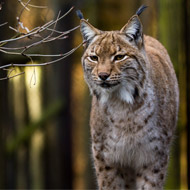NSA blames sheep deaths on escaped lynx

Natural England is currently considering an application from the Lynx Trust UK, which is proposing a trial reintroduction. (Stock photo)
The National Sheep Association (NSA) is claiming an escaped lynx is to blame for the deaths of seven sheep in Wales.
Young Eurasian lynx Lilleth escaped from the Borth Wild Animal Kingdom at the end of last month.
The NSA says a post-mortem carried out on sheep by Welsh Government officials found the cause of death to be a single bite to the neck.
However, a spokeswoman for the Borth zoo told Farmer’s Weekly that it is “very unlikely that Lilleth had killed the sheep”.
She added: “The autopsy on one of the dead sheep came back inconclusive. We await the result of blood tests later in the week.”
Lilleth is thought to have climbed some slender tree branches in her enclosure, before making a ‘giant leap’ to the perimeter fence, which is electrified.
There have been a number of sightings of the lynx in the surrounding area and zoo keepers are currently tracking her, with the help of cameras and bait traps. The zoo will remain closed until she is caught.
Dyfed-Powys Police warned the public not to approach Lilleth as she may become aggressive if cornered. Any sightings should be reported by calling 101, or the zoo on 01970 871224.
The NSA has long campaigned against proposals to reintroduce Eurasian lynx to parts of the UK. In a statement, the trade association referred to the sheep deaths as a ’stark warning’. Natural England is currently considering an application from the Lynx Trust UK, which is proposing a trial reintroduction in Kielder Forest, Northumberland.
Borth Wild Animal Kingdom and the Lynx Trust UK have been contacted for comment.



 The veterinary mental health charity Vetlife is inviting the veterinary community to join it for a sponsored cold-water dip.
The veterinary mental health charity Vetlife is inviting the veterinary community to join it for a sponsored cold-water dip.